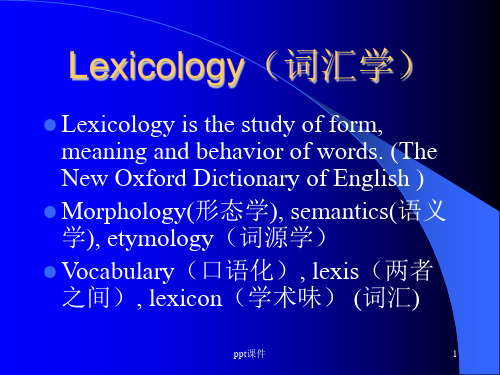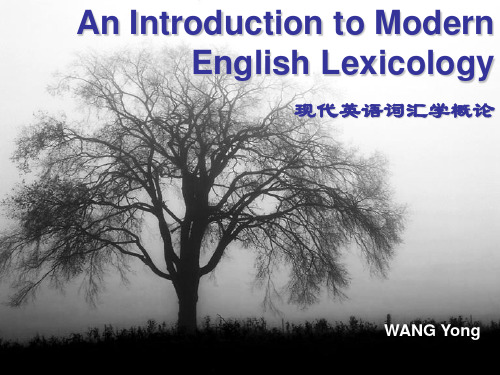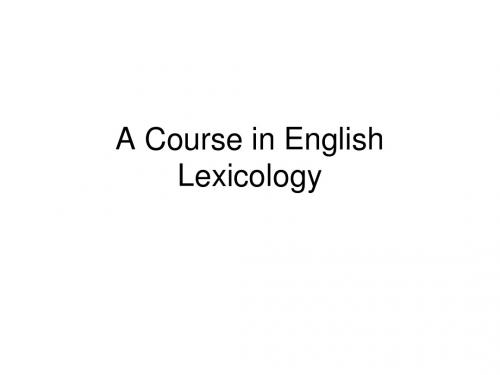词汇学课件1
合集下载
词汇学-- 词义的分类及分析PPT课件

• Contamination from linguistic collocations;
12
Associative Meaning
Connotative
Meaning 内涵意义
Stylistic
Meaning 文体意义
Affective
Meaning 情感意义
Collocative Meaning 搭配意义
语法意义&词汇意义 • Grammatical meaning indicates
grammatical concept or relationships such as parห้องสมุดไป่ตู้ of speech of words, singular and plural meaning of nouns, tense meaning of verbs and their inflectional paradigm.
所以,一个词在不同的语境中有不同的语法形 式来表达不同的语法意义,但词汇意义却保持 不变。
9
2. Conceptual Meaning & Associative Meaning 概念意义&联想意义
• Conceptual meaning is meaning given in the dictionary and forms the core of word meaning.
• The settings in which such lexemes are employed;
• Cultural values associated with the referents of the lexemes;
• The occurrence of such lexemes in prior texts;
12
Associative Meaning
Connotative
Meaning 内涵意义
Stylistic
Meaning 文体意义
Affective
Meaning 情感意义
Collocative Meaning 搭配意义
语法意义&词汇意义 • Grammatical meaning indicates
grammatical concept or relationships such as parห้องสมุดไป่ตู้ of speech of words, singular and plural meaning of nouns, tense meaning of verbs and their inflectional paradigm.
所以,一个词在不同的语境中有不同的语法形 式来表达不同的语法意义,但词汇意义却保持 不变。
9
2. Conceptual Meaning & Associative Meaning 概念意义&联想意义
• Conceptual meaning is meaning given in the dictionary and forms the core of word meaning.
• The settings in which such lexemes are employed;
• Cultural values associated with the referents of the lexemes;
• The occurrence of such lexemes in prior texts;
Unit 3 Lesson 1 词汇学习课件-高中英语北师大版(2019)必修第一册

➢ surrounding (adj.) 周围的,附近的 ➢ surroundings (n.) 周围的事物,环境
Ⅰ.单句填空 (1) People say it is Canada’s most beautiful city,__s_u_r_r_o_u_n_d_ed__ (surround) by mountains and the Pacific Ocean.
(2) He loves to surround himself __w__it_h__ his family and friends.
➢ surround sb./sth. with ...
(3) I’d like to bring up my child in healthy __s_u_r_ro_u_n_d_i_n_g_s__(surround).
scare
/skeə/
vt.吓唬;使(某人)惊恐
➢ scare sb/sth away (把……吓跑 )
[教材典例P52] Mrs Chen said that it was to scare away the monster Nian.
➢ scared (adj.) 感到害怕的;惊恐的
be scared of doing sth. be scared to do sth.
flight
/flaɪt/
n. 航班
wine
/waɪn/
n.葡萄酒
surround
/səˈraʊnd/
vt. 环绕,围绕
➢ surround sb./sth. with ... (用...包围某人/物) ➢ be surrounded by/with(被...包围)
e.g. The famous pop star was surrounded by his fans.
Ⅰ.单句填空 (1) People say it is Canada’s most beautiful city,__s_u_r_r_o_u_n_d_ed__ (surround) by mountains and the Pacific Ocean.
(2) He loves to surround himself __w__it_h__ his family and friends.
➢ surround sb./sth. with ...
(3) I’d like to bring up my child in healthy __s_u_r_ro_u_n_d_i_n_g_s__(surround).
scare
/skeə/
vt.吓唬;使(某人)惊恐
➢ scare sb/sth away (把……吓跑 )
[教材典例P52] Mrs Chen said that it was to scare away the monster Nian.
➢ scared (adj.) 感到害怕的;惊恐的
be scared of doing sth. be scared to do sth.
flight
/flaɪt/
n. 航班
wine
/waɪn/
n.葡萄酒
surround
/səˈraʊnd/
vt. 环绕,围绕
➢ surround sb./sth. with ... (用...包围某人/物) ➢ be surrounded by/with(被...包围)
e.g. The famous pop star was surrounded by his fans.
词汇学PPT课件

Major Features of Words
1. A word is a sound or combination of sounds which we make voluntarily with out vocal equipment.
Major Features of Words
2. A word is symbolic and is used to stand for something else. In each language, sounds are used to represent objects, happenings, or ideas.
5. A word may consist of one or more morphemes. It can be broken down into smaller meaningful units.
Major Features of Words
6. Words are part of the large communication system we call language. A word is partly dependent for meaning upon its use in that larger context.
1. Definition of a Word
A word is a minimal free form of a language that has a given sound, meaning and syntactic function.(张维友)
Definition of a word
daydream
Mew-mew喵 喵
Naturalists
There is an intrinsic
英语词汇学 ppt课件

and suffixation? 3. What do we mean by literary and common
words? 4. What is the difference between grammatical
meaning and lexical meaning? 5. What are the differences between
meaning), capable of performing a given syntactic function.词是语言组织中的基本 单位,能独立运用的,具有声音 、意义 和语法功能。
ppt课件
12
1.The Development of the English vocabulary(英语发展史)
eg. (1) hām(home)的变格: Singular
Subjective hām
Possessive hāmes
Patient
hāme
Objective hām
Plural hāmas hāma hāmum hāmas
ppt课件
23
6)Loan Words 外来语
(1) Introduction of Christianity(基督教) Fr. Latin: bargain, cheap, inch, pound, cup, dish, wall, wine, etc.; abbot, alter, candle, disciple, hymn, martyr, num, priest, pope, shrine, temple, etc. (2) Scandinavian invasion — Vikings Fr. Old Norse: are, they, their, them, till, call, die give, take skin, sky, window, ill, weak, etc.
words? 4. What is the difference between grammatical
meaning and lexical meaning? 5. What are the differences between
meaning), capable of performing a given syntactic function.词是语言组织中的基本 单位,能独立运用的,具有声音 、意义 和语法功能。
ppt课件
12
1.The Development of the English vocabulary(英语发展史)
eg. (1) hām(home)的变格: Singular
Subjective hām
Possessive hāmes
Patient
hāme
Objective hām
Plural hāmas hāma hāmum hāmas
ppt课件
23
6)Loan Words 外来语
(1) Introduction of Christianity(基督教) Fr. Latin: bargain, cheap, inch, pound, cup, dish, wall, wine, etc.; abbot, alter, candle, disciple, hymn, martyr, num, priest, pope, shrine, temple, etc. (2) Scandinavian invasion — Vikings Fr. Old Norse: are, they, their, them, till, call, die give, take skin, sky, window, ill, weak, etc.
词汇学之3种构词法PPT课件

counter
act
argument example revolution
5. Prefixes of attitude (3)
anti
social
national clockwise slavery
5. Prefixes of attitude
prefixes
meaning
examples
co-
prefixes meaning
examples
arch-
supreme
archbishop
superout-
more than surpassing
supermarket outlive
sur-
over
surcharge
sub-
below
subnormal
overunder-
excessive too little
meaning
not, the converse
of
examples unwise
nonessential dishonest informal immature illegal irregular
2. Reversative prefixes (1)
un
pack
wrap
do
dress
2. Reversative prefixes (2)
8.Number prefixes
prefixes
quinqu-, pentahexa-, sex-
meaning five
six
sept-, heptaoctaennea-
seven eight nine
examples
quinquagenarian, pentagon
act
argument example revolution
5. Prefixes of attitude (3)
anti
social
national clockwise slavery
5. Prefixes of attitude
prefixes
meaning
examples
co-
prefixes meaning
examples
arch-
supreme
archbishop
superout-
more than surpassing
supermarket outlive
sur-
over
surcharge
sub-
below
subnormal
overunder-
excessive too little
meaning
not, the converse
of
examples unwise
nonessential dishonest informal immature illegal irregular
2. Reversative prefixes (1)
un
pack
wrap
do
dress
2. Reversative prefixes (2)
8.Number prefixes
prefixes
quinqu-, pentahexa-, sex-
meaning five
six
sept-, heptaoctaennea-
seven eight nine
examples
quinquagenarian, pentagon
词汇学Word-Meaningppt课件

16
(3).Social meaning: Based on: ①the social relationship between the
speakers;②the occasion;③the subject matter;④ the mode of speech;etc. eg: What’s your age? (对求职者)
14
2.Lexical meaning:
(1).Denotative meaning: It is the central factor in linguistic communication. eg: chair → 椅子 mother → 母亲 man → 男人 woman → 女人 politician → 政客 blood → 血液 chicken → 小鸡 adumeaning: eg: chair → 官位 mother → love, care, tenderness man → 勇敢,强壮,责任心,大度 woman → 意志薄弱,爱流泪,多情善感 (Anyway,she is a woman.) politician → 欺诈,夸夸其谈 blood → 出身,亲情,民族 (Blood is thicker than water. He has Canadian blood) chicken → 懦弱,胆怯 adult → 责任
你吃了吗? (denotative meaning; connotative meaning)
17
(4).Affective meaning: a.Interjections: Oh! Alas! Ouch! b.Approval and disapproval: mother, scholar, masterpiece, career, buzz, gang, boast, workaholic, etc. c.Bias: slender — skinny, statesman — politician, famous — notorious proud — arrogant (褒义) (贬义)
(3).Social meaning: Based on: ①the social relationship between the
speakers;②the occasion;③the subject matter;④ the mode of speech;etc. eg: What’s your age? (对求职者)
14
2.Lexical meaning:
(1).Denotative meaning: It is the central factor in linguistic communication. eg: chair → 椅子 mother → 母亲 man → 男人 woman → 女人 politician → 政客 blood → 血液 chicken → 小鸡 adumeaning: eg: chair → 官位 mother → love, care, tenderness man → 勇敢,强壮,责任心,大度 woman → 意志薄弱,爱流泪,多情善感 (Anyway,she is a woman.) politician → 欺诈,夸夸其谈 blood → 出身,亲情,民族 (Blood is thicker than water. He has Canadian blood) chicken → 懦弱,胆怯 adult → 责任
你吃了吗? (denotative meaning; connotative meaning)
17
(4).Affective meaning: a.Interjections: Oh! Alas! Ouch! b.Approval and disapproval: mother, scholar, masterpiece, career, buzz, gang, boast, workaholic, etc. c.Bias: slender — skinny, statesman — politician, famous — notorious proud — arrogant (褒义) (贬义)
英语词汇学精品PPT课件

-- from Linguistics in Language Teaching. Cambridge, MA: MIT Press.,1972: 111 (Wilkinson)
9
About the course
ORIENTATION
10
1.1 Aims of the course
– Give a systematic description of the English vocabulary.
16
• What is a word?
– The minimal free form of a language, which has a given sound, meaning and syntactic function.
– Ultimately improve your receptive and productive skills in language processing as well as language production.
12
1.3 Arrangements
• Oral Presentation
– Group of 4-5 for ONE CHAPTER – One group each week
• Essay
– A short essay about the relevant topic(s) – 3 weeks before the end of the course
13
1.4 Grade
• Oral presentation • Short essay • Final exam
14
An Introduction to Modern English Lexicology
9
About the course
ORIENTATION
10
1.1 Aims of the course
– Give a systematic description of the English vocabulary.
16
• What is a word?
– The minimal free form of a language, which has a given sound, meaning and syntactic function.
– Ultimately improve your receptive and productive skills in language processing as well as language production.
12
1.3 Arrangements
• Oral Presentation
– Group of 4-5 for ONE CHAPTER – One group each week
• Essay
– A short essay about the relevant topic(s) – 3 weeks before the end of the course
13
1.4 Grade
• Oral presentation • Short essay • Final exam
14
An Introduction to Modern English Lexicology
词汇学第一讲

1.3 Sound and Form
• It is generally agreed that the written form of a natural language is the orthographical(拼法) record of the oral form. Naturally the written form should agree with the oral form. In other words, the sound should be consistent with the form. • Question: Do you think such viewpoint lies in our real language world?
• To sum up, the definition of a word will cover the following points: • (1)a minimal free form of a language • (2)a sound unity • (3) a unit of meaning • (4) a form that can function alone in a sentence. • Then can you give a definition according to the above points?
• Example, some short vertical strokes such as “i, u, v, m, w, n” looked all alike, consequently, their handwriting caused misunderstanding, to solve the problem in part, they changed the letter “u” to “ o ”when it came before “m, n, v.”(we have no “uv”, immoral, impolite, illegal, irregular)
- 1、下载文档前请自行甄别文档内容的完整性,平台不提供额外的编辑、内容补充、找答案等附加服务。
- 2、"仅部分预览"的文档,不可在线预览部分如存在完整性等问题,可反馈申请退款(可完整预览的文档不适用该条件!)。
- 3、如文档侵犯您的权益,请联系客服反馈,我们会尽快为您处理(人工客服工作时间:9:00-18:30)。
I. The development of English vocabulary.
A. Three periods of English language. 1. Old English (450-1100) About 50,000 or 60,000 words. 80% was no longer used. During this period, there are two historical events that have a great influence on English very much. Latin had a great influence on English. ( bargain, cheap, pound, inch, cup, pope, priest, temple, hymn, candle)
b. late modern English (after 1700)
French greatly influenced English words. The territorial expansion of English empire resulted in the expansion of English vocabulary. Borrowed words from non-European countries. Potato, tobacco, chocolate from Mexican Banana, zebra from Africa, coffee from Turkey
II. The content of lexicology
Chapter One General survey of English vocabulary Chapter Two Morphological structure of English words Chapter Three Word-Formation Chapter Four Word meaning and semantic features Chapter Five Polysemy and homonymy Chapter Six Sense relations between words Chapter Seven Meaning and context Chapter Eight Changes in word meaning Chapter Nine English idioms
3. Modern English (1500-the present)
a. In the early stage (1500-1700)-Early modern English
The Renaissance brought great changes to vocabulary. Latin words and Greek words were introduced to English. Latin words on science were introduced. e.g. chemist, function, scientific etc. Greek words: e.g. comedy Drama,, tragedy, criterion, physics
Chapter One General Survey of English Vocabulary
The definition of “word”, “vocabulary”. For centuries, linguists have given different definitions to “word”. Generally, there are two common definitions by 2 linguists. By Bloomfield: A word is a minimum free form. It can be used separately in a sentence. Free form is a form which occurs as a sentence. e.g. Wait, lion, agree Bound form can never be used in a sentence. e.g. Lioness, waiter, agreement, allowed, unfair
Introduction of the course
I. The definition of “lexicology”
Lexicology: A branch of linguistics concerned with the vocabulary of the English language in respect to words and words equivalents. W.E. : an idiom and set phrase representing a semantic unit and functioning as a single word in a sentence. 1.She is the apple of his father’s eye. 2. He’s well off.
2. Borrowed/Loaned words in the English vocabulary.
1)The French element in the English vocabulary. a. French loaned words in the Middle English. b. After Middle English ( words connected with art, food, and drink. e.g. chef, restaurant, café, prestige, fiancée, bourgeois) 2) The Latin element a. Latin words in the old English. (church, pope, priest, temple, hymn, candle)
Scandinavian ( them, both, anger, cake, egg, leg, sky, sister, happy, ill, weak, wrong, ugly, loose, die, trust, want, call, get, hit, give) 2. Middle English (1100-1500) During this period, French has a great effect on English vocabulary. e.g. Law (judge, justice, government, parliament) religion (baptism, confess, divine) clothing (coat, dress, gown) food (beef, mutton, pork) science (medicine, surgeon)
II. English new words (Neologisms) 1.The reasons of the rapid growth of present day English vocabulary 1) The rapid development of modern science and technology.
b. Latin words in the Middle English. ( genius, include, history, legal, minor, picture, nervous, necessary, popular, private, polite, quite, moderate , prevent) c. Latin borrowings after the Renaissance. During this period, some abstract and scientific words were adopted. e.g. education, civil, examination, autograph, expensive, appropriate, emancipation, exist, extinguish
4) The Scandinavian element ( them, both, anger, cake, egg, leg, sky, sister, happy, ill, weak, wrong, ugly, loose, die, trust, want, call, get, hit, give) 5) Other foreign elements. Italian. (art, architecture. e.g. balcony, design, corridor, violin,, solo, duet.) concert, piano Germany: zinc, quartz, waltz. Indian English: ginger, jungle, pajamas Japanese: tycoon, tatami, soy, Judo Chinese: typhoon, tea, wok, silk, china
a. Words connected with nuclear bomb b. Words connected with space. e.g. astronaut, spaceman, space-station, space suit, space shuttle. c. Words on computer.
B. Two groups of English vocabulary.
1. Words of native origin. Native words are the foundation and the core of English vocabulary. They are mostly monosyllabic ords, express the fundamental concepts dealing with everyday objects and life. 100, the most commonly-used words are all from native words. Linguists say that if you know 1000 the most common-used English words, you can understand English article 80% Native words are basic words in English vocabulary.
